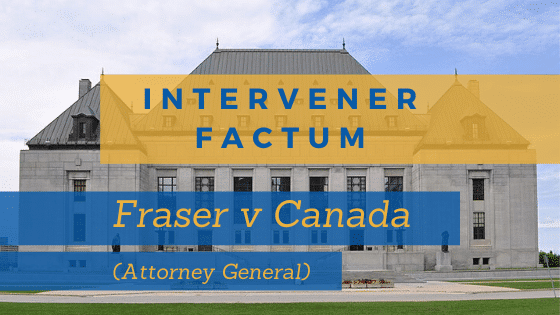
On Friday, November 22, 2019, the Women’s Legal Education and Action Fund (LEAF) filed its intervener factum with the Supreme Court of Canada (SCC) in Fraser v Canada (Attorney General), a case about equal access to pensions for female RCMP officers with caregiving responsibilities.
The Facts
Joanne Fraser, Allison Pilgrim and Colleen Fox (the “Appellants”) are former Royal Canadian Mounted Police (RCMP) officers who participated in the RCMP’s job-sharing program. Under the job-sharing program, two employees would split the hours of one full-time position.
Under the RCMP pension plan, employees who job-share are not able to “buy back” pension contributions for the hours they did not work. In contrast, employees who took an unpaid leave of absence were entitled to “buy back” contributions for their time off. Employees who took the job-sharing option were overwhelmingly women with childcare obligations, resulting in their unequal access to fulsome pension benefits. The Appellants allege that their lack of ability to “buy back” the pension contributions for the years when they job-shared was a violation of their s 15 equality rights under the Charter.
LEAF’s Intervention
LEAF submits that courts must always give full consideration to the context of the Appellants’ claim, including the systemic devaluation of women’s work and caregiving responsibilities, in order to engage in a proper substantive equality analysis, which has been described as the “engine” of s 15 of the Charter.
Section 15’s purposes of promoting substantive equality and preventing the perpetuation of pre-existing disadvantage can only be realized if courts ground their analysis in the claimants’ perspective, including the social, political and legal context structuring their claims.
In this case, however, the robust concept of substantive equality required by the s 15 test was undermined by the lower courts who ignored the very context surrounding the design of the RCMP pension plan. This context includes the fact that RCMP remains a male-dominated workplace, and that the pension plan is based upon “male pattern employment” of a permanent, full-time worker with long and uninterrupted service, and providing enhanced access to pension benefits to those who fit this norm.
Gendered child, elder and other family caregiving responsibilities have historically driven and continue to drive “female pattern employment”, creating the overrepresentation of women in part-time work, including job-sharing. The systemic devaluation of women’s work and caregiving contributions that implicitly marginalizes work arrangements outside of the male full-time norm has resulted in the gendered nature of differential access to workplace benefits, including in such areas as pension design.
By abstracting their analysis from the relevant context, the lower courts erroneously concluded that the Appellants’ pensions were impacted because they had chosen to job-share. The focus of the court’s analysis should not be on the “choice” of the women to work in temporary job-shares in order to meet family care responsibilities. Rather, the court must focus on the government’s design of the pension plan which, regardless of the government’s intent, effectively privileges “male pattern employment” and has an adverse impact of lower pensions for workers encumbered with family caregiving responsibilities. The lower courts’ analysis fails to consider whether the government should have designed the pension scheme differently to provide “equal benefit of the law” to employees engaged in diverse, gendered employment patterns.
Read LEAF’s factum for further details.
Hearing
The hearing for this case will take place on December 12, 2019.
Counsel and Case Committee Members
LEAF’s interventions are all guided, informed and supported by a case committee composed of academics and practitioners with expertise in the relevant issues. The case committee members for this intervention were Clio Godkewitsch, Jennifer Koshan, Kathleen Lahey, Nathalie Léger, Elizabeth Shilton, Susan Ursel, Jonette Watson Hamilton, and Claire Young. LEAF gratefully acknowledges their contributions to the arguments in this factum.
LEAF is grateful to the pro bono counsel of Kate Hughes, Jan Borowy and Danielle Bisnar of Cavalluzzo LLP, who will be representing LEAF before the SCC.
About Women’s Legal Education and Action Fund (LEAF)
The Women’s Legal Education and Action Fund (LEAF) works to advance the substantive equality rights of women and girls through litigation, law reform, and public education. Since 1985, we have intervened in landmark cases that have advanced equality in Canada—helping to prevent violence, eliminate discrimination in the workplace, provide better maternity benefits, ensure a right to pay equity, and allow access to reproductive freedoms. For more information, please visit www.leaf.ca
For media inquiries, contact:
Danielle Bisnar, Partner
Cavalluzzo LLP
T: 416.964.5535
E: [email protected]
Rosel Kim, Staff Lawyer
Women’s Legal Education and Action Fund (LEAF)
T: 416 595 7170 ext 2003
E: [email protected]
